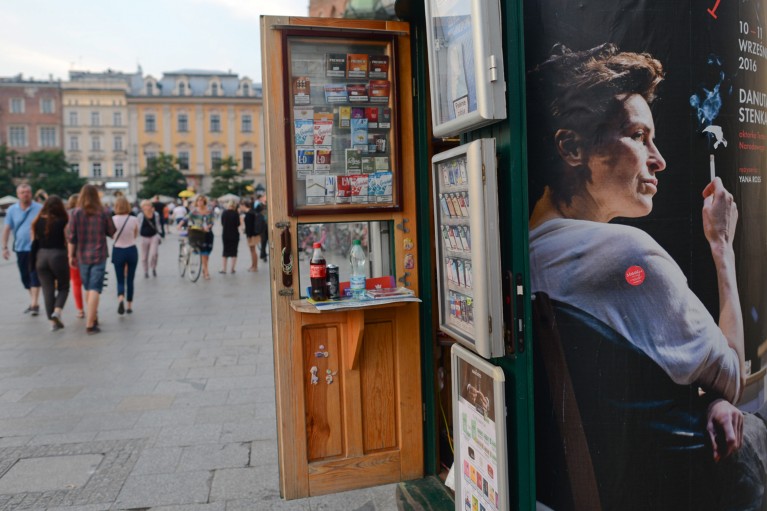
A tobacconist kiosk in Krakow, Poland, where researchers and anti-smoking campaigners were labelled ‘militant extremists’.Credit: Artur Widak/NurPhoto/Getty
Scientists who study harms caused by tobacco, alcohol and ultra-processed foods can face cyberattacks, lawsuits, surveillance and physical violence, a study finds. Many are labelled extremists, fascists, zealots and prohibitionists, it adds.
The study is a review of evidence gathered by a team of researchers who are based in the United Kingdom, United States and France. It was published last month in Health Promotion International1.
The team compiled and reviewed public data and reports of intimidation tactics used by the tobacco, ultra-processed food (UPF) and alcohol sectors between 2000 and 2022, and focused on 64 sources containing examples of intimidation mentioned in published articles up to 2021.
The most common tactic (found in half of the sources) was public discreditation: academics, advocates and their work were publicly criticized in newspapers, advertisements, public statements, websites, social media and other public forums, such as responses to public consultations and television interviews.
Industry tactics
The study mentions a paper covering a planned campaign to encourage smoking among young people in Poland2, which was sent to tobacco-company executives. The campaign documents described “militant extremists” attacking their industry. In other instances, smokers have been termed targets of “health fascists”, and tobacco-control advocates were called “nicotine Nazis”3, as well as zealots4 and prohibitionists5.
The authors argue that the abuse faced by advocates and researchers aimed to delay, derail or prevent regulation.
Six of the sources described violent threats or actual physical violence towards people advocating for increased regulation of tobacco and sugar-sweetened beverages. These cases took place in Argentina, Colombia, Mexico, Nepal, Indonesia and the United Kingdom.
In one extreme case in Nigeria in 2012, a leading tobacco-control advocate made media appearances in which he criticized the tobacco industry. He and his children were later threatened at gunpoint in his home, and his house guard and brother-in-law were shot and killed.
The Colombia case involved physician Esperanza Cerón, the head of a consumer-advocacy group in that was campaigning to introduce a 20% tax on sugary drinks. Cerón says she reported the case to federal investigators, alleging menacing phone calls and, on one occasion, being followed in her car by two men on motorcycles who then threatened her, according to media reports.
The majority of sources said that, despite the intimidation, researchers were not deterred from their work. The study says: “Nevertheless, the dominant narrative was of perseverance, with only two sources referring to staff leaving their job and another individual potentially withdrawing from some of their usual advocacy activities.”
Researchers respond
Co-author Karen Evans-Reeves, a tobacco-control researcher at the University of Bath, UK, says: “I have been ridiculed on social media, my work has been criticized publicly by a tobacco company and by neoliberal bloggers, I have received Freedom of Information requests [a request submitted to a UK public authority] and a couple of legal threats if I continued with my work. This is incredibly distressing for those targeted, to know that you are being watched.”


